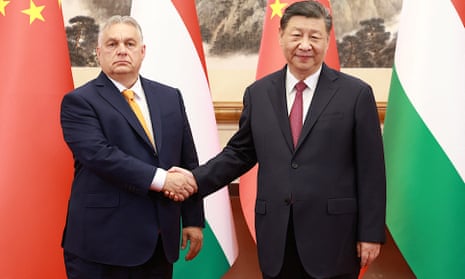International community should ‘create conditions’ for negotiations, says Xi Jinping – Ukraine war live
Hello and welcome to the Guardian’s live coverage of the war in Ukraine. The time has just gone past 10:40am in Kyiv.
Hungary’s prime minister, Viktor Orbán, who is Europe’s most pro-Russian leader, met Chinese President Xi Jinping on Monday, days after holding talks on a potential Ukrainian peace deal with Vladimir Putin.
The Chinese leader told visiting Orbán that world powers should help Russia and Ukraine re-start direct peace talks, state broadcaster CCTV reported.
“The international community should create conditions and provide assistance for the two sides to resume direct dialogue and negotiations,” Xi told Orban, adding: “Only when all major powers exert positive energy rather than negative energy can the dawn of a ceasefire in this conflict appear as soon as possible.”
China, which has close ties to Russia, has been promoting a six-point peace plan it issued with Brazil in May, while Orbán has kicked off a so-called “peace mission” after his country assumed the EU’s rotating presidency at the beginning of this month.
Orbán’s visit comes after he met Ukrainian President Volodymyr Zelenskiy in Kyiv and also went to the Kremlin, a trip that drew a strong rebuke from his allies.

In other developments:
Russia launched a missile attack against Ukraine this morning, the second such strike in the past few hours, the Kyiv Independent reports. Telegram channels reported explosions in Kropyvnytskyi in the Kirovohrad region and Kryvyi Rih in Dnipropetrovsk region. Air defence was also reported as being active in Kyiv’s suburbs, while the Ukrainian air force reported downing three out of the four cruise missiles fired over Zhytomyr and Cherkasy oblasts earlier in the day.
Nato will need between 35 and 50 extra brigades to fully realise its new plans to defend against an attack from Russia, a military source told Reuters.
Chinese military personnel are to begin joint “anti-terrorist training” with their counterparts in Belarus on Monday, close to the border with Poland. The “Eagle Assault” exercises by the two Russian allies amid the war in Ukraine will be held over 11 days in the border city of Brest, Belarus, and will involve tasks such as hostage rescue and anti-terrorism operations, China’s ministry of national defence said. It comes days after Belarus officially joined the Shanghai cooperation organization led by China and Russia, deepening their coordination on military, economic and political matters.
Russia’s Federal Security Service (FSB) blocked an attempt by Ukraine to organise the hijacking of a Russian Tu-22M3 strategic bomber and fly it to Ukraine, the FSB said on Monday. “Ukrainian intelligence intended to recruit a Russian military pilot for a monetary reward and the provision of Italian citizenship, to persuade him to fly and land a missile carrier in Ukraine,” the FSB said. These claims have not yet been independently verified.
The Netherlands will begin sending F-16 fighter jets to Ukraine “without delay”, after export licences were granted, foreign minister Caspar Veldkamp said during a visit to Kyiv at the weekend.
The UK’s newly appointed defence secretary, John Healey, announced a fresh British military aid package for Ukraine on Sunday as he visited the southern port city of Odesa and met with his counterpart Rustem Umerov. The move is designed to reassure Ukraine and demonstrate to Moscow that UK military backing remains unchanged after last week’s change of government and ahead of this week’s Nato summit, where additional military help for Kyiv will be discussed. US House Speaker Mike Johnson will meet with Zelenskiy on Wednesday during the summit.